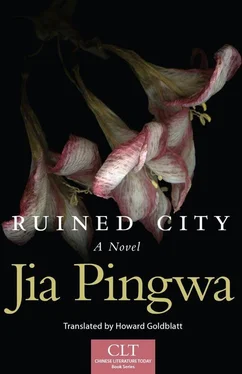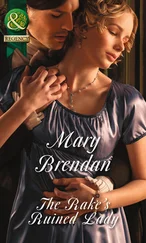“This is probably how a coup d’état is plotted,” Meng said.
“And maybe a Politburo meeting. A few people talk something over at someone’s house, and national policy is formulated. I once read an article about Mao Zedong meeting with Zhou Enlai and Liu Shaoqi at his house about national affairs. They talked late into the night after a bowl of noodles. Liu Yue, why don’t you make us each a bowl of noodles?”
She went to the kitchen and almost immediately brought out seven bowls of noodles. They sat down to eat before dispersing.
Zhuang did not get up until the noon the following day. He read the articles, which got him cursing. They were terrible, filled with errors. They gave him such a headache that he crumpled them up and tossed them into the toilet. Niu Yueqing fished them out and told Liu Yue to dry them on the balcony. Zhuang went out onto the balcony with a broom and swept the pages over the railings. Seeing her husband’s mad behavior, Niu Yueqing was on the verge of tears. “They’re not yours. What do you care about their quality? All we need is to get them published.”
“Who would publish crap like that?”
“So you don’t want to win the lawsuit?”
Breathing hard, Zhuang sat down. Then he got back up and went in search of two of his own unpublished essays. “I’ll go to talk to people at the culture and arts section at the provincial paper. We’ll put his son’s name on these and get them published first. What kind of writer am I? Do I call myself a writer?” He stumbled out the door and slammed it so hard the house shook.
The essays appeared two days later. Zhou Min bought copies of the paper and gave Bai Yuzhu one. Beside himself with joy, he asked when the other two would be published. When Zhou relayed Bai’s question, Zhuang flew into a rage. “Aren’t two enough for him? No more. I won’t do it again. Even if I won the lawsuit, I would still be the biggest loser.”
Zhou dared not say a word, while Niu Yueqing got a tongue-lashing for offering her view. She decided not to talk back; instead she tried to make Zhou feel better before going to see Meng Yunfang in hopes that he could talk Zhuang around. Then she was worried he would be mad at her for doing that. She felt exploited and shed secret tears.
Liu Yue stayed to cook for the couple while making two trips a day to prepare meals for Niu’s mother, who was suffering from her old problem again, complaining that the doors were getting thicker and that the shadows etched on the door came alive every night. She wanted Zhuang to come burn them. When Liu Yue said he was too busy to make the trip, she argued with the girl, saying that Zhuang was her son-in-law, not someone under Liu Yue’s thumb, and that she wasn’t his wife. That so upset Liu Yue that she did a terrible job cooking, wishing the old woman an early death. She would have given her sleeping pills for a few quiet days if not for her fear of potential health problems. In the end, the old woman walked to the compound with the help of her cane and got Zhuang to come out with her. Though the street wasn’t particularly crowded on the road to Shuangren fu Avenue, she complained that it was so packed she could hardly move. Then she pointed to three people sleeping on the street and said they were so skinny she could see their ribs. Zhuang looked, but saw nothing.
“Mother must be seeing ghosts.”
“I can’t tell the difference, so maybe they are ghosts,” she said as she thrust her cane around as if fighting her way through a crowd. Zhuang thought she might have a point; if everyone turned into a ghost after death, wouldn’t there be more ghosts than humans by now?
When they reached Shuangren fu Avenue, she told Zhuang to strip the shadows off the doors. Of course he couldn’t do that, so she said: “Just stand there. You’re a celebrity with lots of energy, so everyone is afraid of you. You’ve given me the courage to do it myself.” She picked up a knife and began carving the door. She said she removed one layer at a time, until she had taken twelve layers off. Holding the strippings as if she were cradling them, she went into the kitchen, where she lit a match to burn them, even asking Zhuang if he could hear the crackling sounds. Suddenly she shouted that a pair of human feet had run off — she had cut them off a cow that had grown human feet. They fled after she chopped them off, so she ran around the house to chase them out. Eventually she got the feet out the door. She had worked up a sweat, but was finally able to sleep peacefully. Zhuang, on the other hand, had trouble sleeping that night, for there seemed to be human feet all over the room, dancing in a variety of styles and leaving footprints on the floor, the walls, and the ceiling. He seemed to have followed the pattern, walking deeper into it until he could no longer get out, since the prints kept changing. He was startled awake, bathed in sweat. He saw no footprints on the floor or on the walls when he turned on the light. The old woman’s talk about footprints must have affected his dream, he told himself. Unable to go back to sleep, he sat outside her bedroom to smoke. She slept holding a pair of tiny shoes in her arms, as the dreary sound of a xun started up, like sobbing ghosts and howling wolves.
Zhuang had now spent a few days at Shuangren fu, but Niu Yueqing did not dare come to take him home. Instead she talked to Meng Yunfang, who suggested that she let him stay with the old woman. He also offered to write two more essays and find a venue for their publication. After Zhuang got over his anger, they would see if he was willing to go to Gong Xiaoyi for the scroll. Niu Yueqing waited daily for Zhou Min to update her on the developments; in the meantime, she entertained Zhao Jingwu and Hong Jiang on their daily visits. Her biggest headache was Bai Yuzhu, who, after being invited over once by Zhou Min, began dropping in regularly at mealtime or late at night. Sometimes he even brought along a group of book lovers who worshipped writers. Niu Yueqing forced a smile as she made tea and offered them cigarettes. By the time the guests had left, she could not stop yawning, so exhausted she could hardly move. Liu Yue swept the floor, reciting her litany of complaints: the visitors tossed their cigarette butts on the floor instead of using the ashtrays; after they spat, they rubbed it in with their shoes; she’d make a pot of tea for one visitor, but he would take a sip or two and then more visitors would arrive, requiring her to make another pot and waste the tea leaves; and they left urine on the rim of the toilet.
Zhou Min was visibly thinner, and his face resembled a porcupine after several days without a shave. He could not stop complaining, saying that Bai Yuzhu had asked about the scroll several times already. So Niu Yueqing urged Meng and Zhao to talk Zhuang into going to see Gong Xiaoyi. He finally agreed to go. One night he and Zhao went to see Gong Xiaoyi, who was in, luckily. Though he was Gong’s only child, he and his father did not get along; Gong Jingyuan had bought a separate place for Xiaoyi so he could avoid being annoyed by the sight of his son. Xiaoyi was a decent host, offering his visitors cigarettes and tea.
“Why have you come, gentlemen? My house is a mess. Try to find a clean place to sit,” Xiaoyi said as he covered the chamber pot under his bed with a newspaper. The house was a pigsty and smelled like piss. Zhuang opened a window before he sat down on the edge of the bed. Xiaoyi sat down on a rattan chair, but was soon sprawled over it; no matter how hard he tried to sit up straight, he ended up curling into the chair, yawning, with teary eyes.
“Have some tea, gentlemen. I have to use the toilet.”
He spent a long time in the bathroom, and at one point Zhao and Zhuang detected a pleasant fragrance; even the wilted leaves of a potted plant perked up. They exchanged a silent look. Eventually Xiaoyi emerged from the bathroom, looking like a different person, his eyes sparkling.
Читать дальше


![Matthew Vincent - [you] Ruined It for Everyone!](/books/216429/matthew-vincent-you-ruined-it-for-everyone-thumb.webp)









